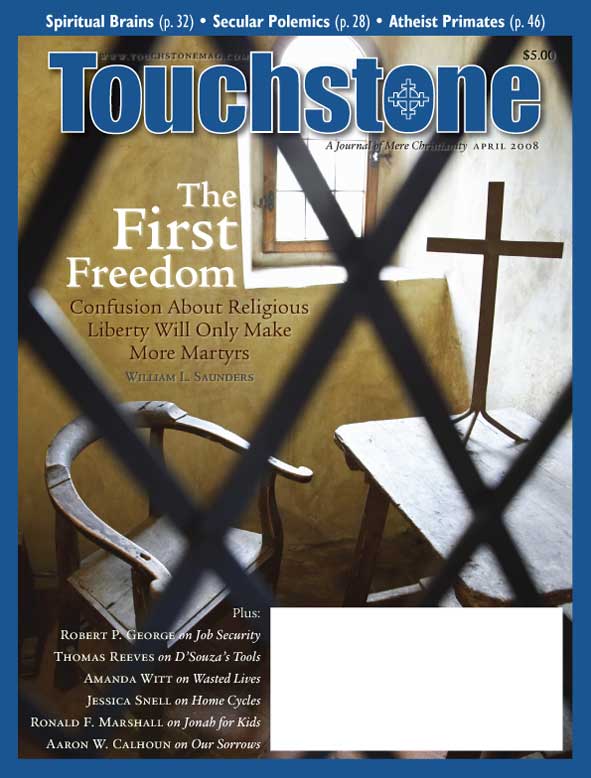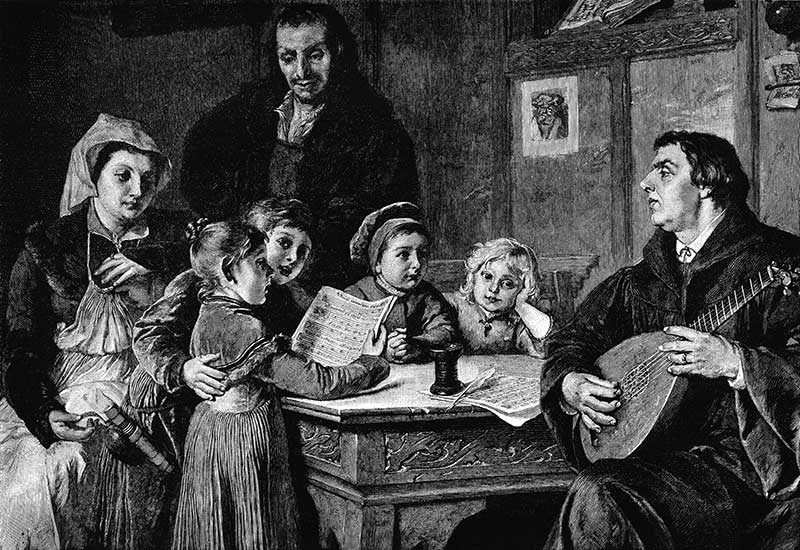Eaten Alive
In Removing the Fear from the Story of Jonah, Children’s Versions Remove the Gospel, Too
by Ronald F. Marshall
Jonah is a horrifying book, with its raging storm and fierce sea-monster, a suicide attempt and near drowning, and, at the end, a confrontation with a massive enemy city. But in American children’s literature it is largely a harmless adventure story, all about travel and intrigue, underwater hideouts, success and fame.
Jonah may not have been eaten alive in the Bible, but he has been in the children’s books. In the nineteen versions I examined for this essay, the horror of the story has been extracted and removed from sight, and with it an important theological and imaginative preparation for the gospel.
Disobedient Jonah
Let us begin with the evasion of Jonah’s disobedience. Why did Jonah not obey God when he was first asked to go to Nineveh? Only at the end of the biblical book does Jonah intimate that he did not obey because of God’s unbearable, excessive leniency with his enemies in Nineveh (4:2). But even with that sketchy explanation, his disobedience remains puzzling, for he is, as Old Testament scholar James Limburg notes, “the only one of the prophets to run away . . . before delivering his message.”
Jonah’s disobedience is mostly ignored in the children’s books (cited only by their authors’ names here; please see the Sources sidebar for complete citations). But some versions exonerate him (Brown, De Graaf, Osborne). Some say he did not go to Nineveh because the evil there was too scary (Bauman, David, Hoth, Karran Wright), others that the trip would have been too taxing (Kenney, Nystrom), and still another says that he simply wasn’t interested in Nineveh (Lanning).
All these books effectively justify Jonah’s disobedience. They present him as a celebrated rebel. He’s able to out-maneuver God and avoid obeying his command. So Jonah’s rebellion is not damning. Rather it authenticates him, marking him out as a free man choosing his own way in life.
But romanticizing Jonah in this way—thinking of him as some sort of glorious challenger of God—shears away the horror of his actual disobedience. The books forget how crucial God considers obedience to be, since, as Martin Luther noted in The Large Catechism, he is “so strict about punishing those who transgress it.”
The disobedient Jonah surely would appeal to children who do not like being told what to do, which may explain why the writers so radically change the biblical story. They describe a Jonah blithely sailing along, oblivious to the consequences of his deeds, which not only diminishes the deadly effects of disobeying God but also makes much of the story that follows incomprehensible. I am tempted to shake my finger and quote Galatians 6:7 at them, saying, “God is not mocked, for you reap whatever you sow.”
Suicidal Jonah
Ronald F. Marshall is pastor at First Lutheran Church of West Seattle in Seattle, Washington, where he has served since 1979. He has published essays on Luther and Kierkegaard. he and his wife of 35 years have three grown children.
subscription options
Order
Print/Online Subscription

Get six issues (one year) of Touchstone PLUS full online access including pdf downloads for only $39.95. That's only $3.34 per month!
Order
Online Only
Subscription

Get a one-year full-access subscription to the Touchstone online archives for only $19.95. That's only $1.66 per month!
bulk subscriptions
Order Touchstone subscriptions in bulk and save $10 per sub! Each subscription includes 6 issues of Touchstone plus full online access to touchstonemag.com—including archives, videos, and pdf downloads of recent issues for only $29.95 each! Great for churches or study groups.
Transactions will be processed on a secure server.
more from the online archives
calling all readers
Please Donate
"There are magazines worth reading but few worth saving . . . Touchstone is just such a magazine."
—Alice von Hildebrand
"Here we do not concede one square millimeter of territory to falsehood, folly, contemporary sentimentality, or fashion. We speak the truth, and let God be our judge. . . . Touchstone is the one committedly Christian conservative journal."
—Anthony Esolen, Touchstone senior editor










